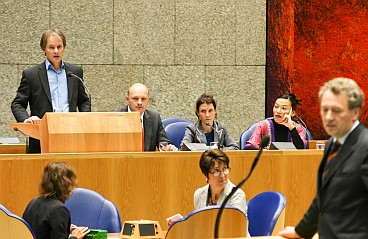SP opposes Lisbon Treaty
SP opposes Lisbon Treaty
The European Treaty, the Treaty of Lisbon, debated this week in Parliament, will bring a federal Europe a step closer, says SP Member of Parliament and European affairs spokesman Harry van Bommel. "The treaty has enormous implications for the Netherlands' state system," he argues.
“The EU's member states will lose the power of veto in numerous policy areas," Van Bommel pointed out. "These include sensitive matters such as justice and police cooperation. "In addition, a majority of the parliaments of the member states will not be able to block a decision, unless this block is supported by the European Commission or the European Commission. This is a major step towards a European Federation. This causes me concern.”
Van Bommel also finds it disquieting that the treaty will create all kinds of new functions, posts and duties at European level, putting European policy into the hands of unelected bureaucrats. There will be a European president, the precise powers of whom have yet to be determined, and a High Representative, a sort of EU Minister for Foreign Affairs. “As far as the European public is concerned," he said, "nothing has become any clearer and the direct influence of the citizens on the governance of Europe is only going to decline."

Harry van Bommel during last week's debate on the Lisbon Treaty.
Due to the fact that the treaty will mean that the Netherlands Parliament will lose some of its powers, while more unelected officials will be taking crucial decisions, the SP feels strongly that a referendum should be held before ratification. In addition, the Lisbon Treaty differs very little from the proposed European Constitution, defeated by the Dutch electorate in 2005. This is not only Van Bommel's view, but also that of former French President Giscard d'Estaing and former Belgian Premier Jean-Luc Dehaene, who together authored the rejected Constitution, German Chancellor Angela Merkel, and Spanish Prime Minister José Luis Zapatero. “The flag and the anthem have been taken out, but when it comes to the powers of national governments and parliaments, for example to determine their own criminal laws, or rights of asylum, this treaty is far-reaching," said Van Bommel.
These are two areas in which the treaty will transfer numerous powers from the national to the European level. As far as the criminal law goes, Van Bommel's fear is that his country's national legal system will be seriously influenced by EU rules and laws, even in areas where the Union has no formal authority. "What will be the consequences for our soft drugs policy?" he asks. "And why should countries such as Romania and Bulgaria, where corruption remains rife, have a say in the European legal system?" He has the same concerns about an integrated European Union asylum policy, which will also be established by the treaty. "The asylum policy of all member states must be harmonised, to ensure that one country isn't any more attractive to an asylum seeker than another. But it will also restrict the member states' freedom of manoeuvre when it comes to dealing with asylum seekers. In the Netherlands we are often more painstaking and also more generous than is the case in many other member states. We should not be required to adapt to their level."
During the debate Van Bommel described it as a "scandal" that there was still no publicly available version of the Lisbon Treaty. "Obviously they don't want the public informed," he said.
- See also:
- Lisbon Treaty
